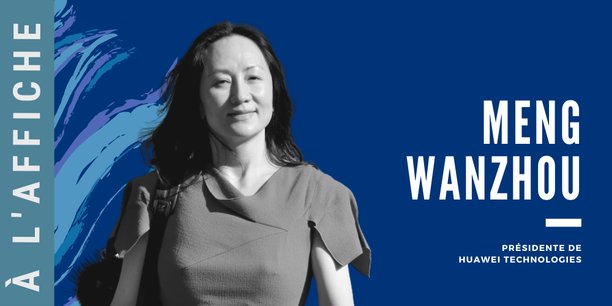His appointment will undoubtedly make the country of Uncle Sam cringe. Meng Wanzhou, current financial director of Huawei, will take over the presidency of the Chinese telecom and smartphone giant this Saturday. In the Middle Kingdom, no one represents better than her the resistance to the attacks of the United States against Chinese tech. Meng Wanzhou, who is none other than the daughter of Ren Zhengfei, the group’s founder, is known to have suffered the wrath of American justice five years ago.
It was at the request of the latter, who accused her of complicity in fraud to circumvent sanctions against Iran, that the leader was imprisoned, then placed under house arrest for three years in Canada. The initiative aroused the ire of Beijing. In the eyes of the Chinese government, this maneuver had only one objective: to destabilize Huawei at a key moment in its development: the arrival of 5G networks. A technology that has allowed the Shenzhen group to take a step ahead of the competition, and which is considered, in China as in the United States, as vital for the development of the economy. Meng Wanzhou was eventually released in September 2021, and the US Department of Justice dropped her charges a year later.
The water has since flowed under the bridges. But Meng Wanzhou takes the reins of Huawei at a time when Sino-American tensions remain high. The group still suffers from bans or strong limitations in several large 5G markets – in particular in the United States, Australia, the United Kingdom, Sweden or France. Huawei has notably been accused by Washington of using its equipment for espionage purposes on behalf of Beijing – which the Chinese giant fiercely denies. It also suffers from severe sanctions imposed by the country of Uncle Sam in 2019. These prohibit it from obtaining certain American technologies. This is the reason why Huawei, which once rivaled Samsung and Apple in smartphones, fell apart in this area. Today, restrictions prevent it, for example, from marketing 5G smartphones.
That said, Huawei has not passed the gun on the left. The group, which unveiled its 2022 results on Friday, reported sales of 642 billion yuan (86 billion euros), up nearly 1% from the previous year. This stabilization of sales constitutes a notable improvement, knowing that in 2021, Huawei had seen its turnover collapse by 30%. On the other hand, the group saw its profits collapse: they amounted to 35.6 billion yuan (4.7 billion euros) in 2022, more than three times less than the previous year. At a press conference, Eric Xu, who was spending his last day as rotating president of Huawei, lamented “a difficult environment” to explain this fall in profits. The leader also clarified that Huawei continued to invest heavily in research and development. In 2022, these expenses represented more than 25% of turnover, a record ratio.
Companies, Huawei’s new target
Pour “keep moving forward in the midst of the storm”, dixit Eric Xu, this flagship of Chinese tech has strengthened its position in other strategic segments, such as cloud or the self-driving car. Huawei is now betting big on the “digital transformation” of companies. Its objective is to offer the most suitable connectivity solutions, terminals and software to professionals in the energy, transport, finance and health sectors to improve their competitiveness.
Will Huawei succeed, then, in relaunching this year? In this regard, Meng Wanzhou was cautious. If she displayed her ” trust ” in the future of Huawei this Friday, the leader recalled that “US restrictions are the new normal” of the group. Meng Wanzhou is aware that the United States plans to strengthen sanctions against Huawei, by extending them to 4G, cloud and Wi-Fi technologies… Difficult, under these conditions, to draw plans on the comet.

